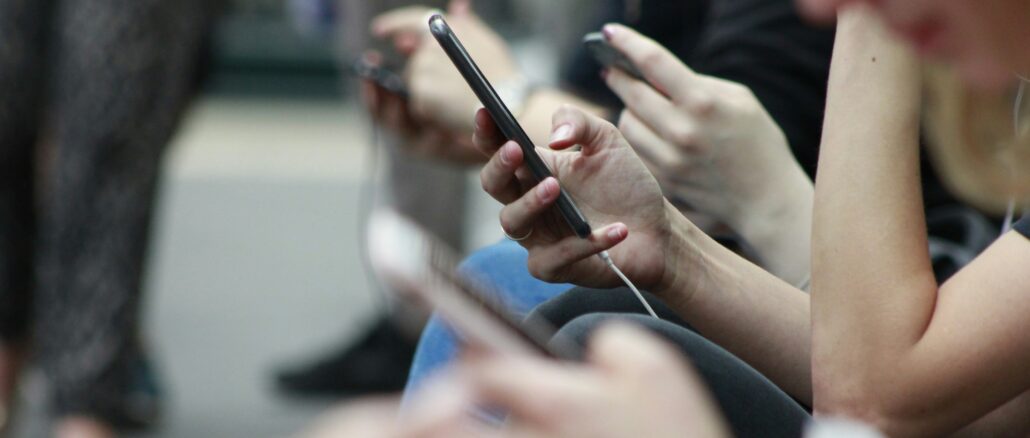
In an era dominated by social media, where platforms like Facebook, Instagram, Twitter, and TikTok are integral parts of daily life, the impact on mental health cannot be overstated. While social media offers unprecedented connectivity and opportunities for self-expression, it also presents a myriad of challenges that can take a toll on one’s well-being. From cyberbullying and constant comparison to the proliferation of false information, the negative effects of social media on mental health are increasingly evident.
Cyberbullying: The Dark Side of Connectivity

Cyberbullying stands as one of the most insidious consequences of social media, leaving a trail of devastation in its wake. Empowered by the anonymity and expansive reach offered by online platforms, individuals may feel emboldened to engage in hurtful behaviour, directing harassment, threats, or malicious comments towards others. The relentless onslaught of cyberbullying can inflict deep wounds on victims, leading to profound feelings of isolation, depression, and anxiety.
The very nature of cyberbullying, with its ability to permeate every aspect of an individual’s online presence, creates a constant state of vulnerability and unease. Victims find themselves subjected to a barrage of abusive messages, derogatory comments, and harmful rumours, invading their digital sanctuary, and encroaching upon their mental well-being. The anonymity afforded by social media platforms often emboldens perpetrators, shielding them from accountability and exacerbating the sense of powerlessness experienced by victims.
For those on the receiving end of cyberbullying, the consequences can be devastating. The relentless onslaught of online abuse can chip away at one’s self-esteem, leaving deep emotional scars that may take years to heal. Victims may experience heightened levels of stress, anxiety, and fear, leading to a pervasive sense of dread every time they log onto their accounts. In extreme cases, cyberbullying can precipitate or exacerbate existing mental health issues, pushing individuals to the brink of despair and even prompting thoughts of self-harm or suicide.
 Moreover, the insidious nature of cyberbullying extends beyond the digital realm, infiltrating every facet of victims’ lives. The psychological toll of incessant harassment can spill over into real-world interactions, straining relationships, and eroding trust. Victims may withdraw from social activities, isolate themselves from friends and family, and experience difficulties concentrating or sleeping because of the trauma inflicted upon them.
Moreover, the insidious nature of cyberbullying extends beyond the digital realm, infiltrating every facet of victims’ lives. The psychological toll of incessant harassment can spill over into real-world interactions, straining relationships, and eroding trust. Victims may withdraw from social activities, isolate themselves from friends and family, and experience difficulties concentrating or sleeping because of the trauma inflicted upon them.
Addressing the scourge of cyberbullying requires a multi-faceted approach that encompasses education, prevention, and intervention. Educating individuals about the impact of cyberbullying and fostering a culture of empathy and respect online are essential steps in combatting this pervasive issue. Social media platforms must also take proactive measures to curb cyberbullying, including implementing robust reporting mechanisms, enforcing strict anti-harassment policies, and providing support resources for victims.
Ultimately, eradicating cyberbullying requires a collective effort from all stakeholders, including individuals, communities, and tech companies. By standing in solidarity with victims, amplifying their voices, and holding perpetrators accountable for their actions, we can create a safer and more inclusive online environment for all. Together, we can work towards a future where social media serves as a platform for connection, empowerment, and positive change, rather than a breeding ground for hatred and harm.
The Perils of Constant Comparison
 The allure of social media lies in its ability to showcase the highlight reels of people’s lives, presenting an idealised version of reality that often feels unattainable. Platforms like Instagram, Facebook, and TikTok are flooded with carefully curated images and posts that depict only the most glamorous and desirable moments, leaving viewers with a skewed perception of what constitutes a fulfilling life. This culture of comparison, where individuals measure their own worth against the seemingly perfect lives of others, can fuel feelings of inadequacy, low self-esteem, and FOMO (fear of missing out).
The allure of social media lies in its ability to showcase the highlight reels of people’s lives, presenting an idealised version of reality that often feels unattainable. Platforms like Instagram, Facebook, and TikTok are flooded with carefully curated images and posts that depict only the most glamorous and desirable moments, leaving viewers with a skewed perception of what constitutes a fulfilling life. This culture of comparison, where individuals measure their own worth against the seemingly perfect lives of others, can fuel feelings of inadequacy, low self-esteem, and FOMO (fear of missing out).
Scrolling through a feed filled with filtered selfies, exotic vacations, and #blessed moments can trigger a sense of inadequacy in even the most confident of individuals. The pressure to keep up with the Joneses, to present a flawless online persona that garners likes and validation, can be overwhelming. As a result, many find themselves trapped in a cycle of comparison, constantly measuring their own achievements and experiences against those of their peers.
The pervasive nature of social media exacerbates these feelings of inadequacy, as individuals are bombarded with a constant stream of aspirational content that reinforces unrealistic standards of beauty, success, and happiness. The fear of missing out on the glamorous lifestyles portrayed online can lead to a relentless pursuit of validation and approval, as individuals seek to emulate the curated lives of influencers and celebrities.
Inevitably, this relentless quest for perfection takes a toll on one’s mental health. Anxiety, self-doubt, and depression are common side effects of living in a world where every moment is scrutinised and compared to an unattainable ideal. The pressure to maintain a flawless online persona can lead to feelings of disconnection and alienation, as individuals struggle to reconcile their authentic selves with the polished facades they present to the world.
It’s important to recognise that social media is not a true reflection of reality. Behind every perfectly curated photo lies a story untold, a struggle unseen. By acknowledging the curated nature of social media content and embracing authenticity over perfection, individuals can reclaim control over their own narratives and cultivate a healthier relationship with social media.
Moreover, setting boundaries around social media usage and prioritising real-world connections can help mitigate the negative effects of constant comparison. By focusing on meaningful relationships and experiences rather than likes and followers, individuals can cultivate a sense of fulfilment and contentment that transcends the superficiality of social media.
In the end, it’s crucial to remember that true happiness cannot be measured in likes or followers. By embracing imperfection, fostering genuine connections, and prioritising self-care, individuals can break free from the cycle of comparison and reclaim their mental well-being in an increasingly digital world.
Spreading False Information: The Rise of Misinformation
 In today’s era of instant information dissemination, social media has emerged as a fertile ground for the proliferation of false information and conspiracy theories. From health misinformation to political propaganda, the unchecked spread of falsehoods poses significant risks to individuals’ mental health and societal well-being. Exposure to misleading or sensationalised content on social media platforms can fuel anxiety, confusion, and distrust, making it increasingly challenging to discern fact from fiction in the digital landscape.
In today’s era of instant information dissemination, social media has emerged as a fertile ground for the proliferation of false information and conspiracy theories. From health misinformation to political propaganda, the unchecked spread of falsehoods poses significant risks to individuals’ mental health and societal well-being. Exposure to misleading or sensationalised content on social media platforms can fuel anxiety, confusion, and distrust, making it increasingly challenging to discern fact from fiction in the digital landscape.
The rapid and widespread dissemination of false information on social media can have far-reaching consequences, both on an individual and societal level. Individuals may find themselves bombarded with conflicting narratives and unsubstantiated claims, leading to a sense of uncertainty and unease. The constant barrage of sensationalised headlines and alarmist rhetoric can fuel anxiety and exacerbate existing mental health issues, as individuals struggle to separate fact from fiction in an increasingly chaotic online environment.
Moreover, the spread of false information can erode trust in institutions, exacerbating feelings of cynicism and disillusionment among the public. When individuals are repeatedly exposed to misleading or deceptive content, they may become increasingly sceptical of authoritative sources of information, including government agencies, scientific institutions, and mainstream media outlets. This erosion of trust can have profound implications for societal well-being, undermining efforts to address pressing issues such as public health crises, climate change, and social inequality.
 The impact of false information on mental health is further compounded by the echo chamber effect of social media algorithms. These algorithms are designed to prioritise content that aligns with users’ existing beliefs and preferences, creating filter bubbles that reinforce ideological biases and shield individuals from opposing viewpoints. As a result, individuals may find themselves trapped in echo chambers where false information is perpetuated and dissenting voices are silenced, further exacerbating polarisation and distrust within society.
The impact of false information on mental health is further compounded by the echo chamber effect of social media algorithms. These algorithms are designed to prioritise content that aligns with users’ existing beliefs and preferences, creating filter bubbles that reinforce ideological biases and shield individuals from opposing viewpoints. As a result, individuals may find themselves trapped in echo chambers where false information is perpetuated and dissenting voices are silenced, further exacerbating polarisation and distrust within society.
Addressing the spread of false information on social media requires a concerted effort from all stakeholders, including social media companies, governments, and individual users. Social media platforms must take proactive measures to combat misinformation, including implementing robust fact-checking mechanisms, promoting authoritative sources of information, and cracking down on accounts that systematically spread false information.
Furthermore, media literacy education is essential in empowering individuals to critically evaluate information encountered on social media and discern fact from fiction. By equipping individuals with the skills to identify misinformation and navigate the digital landscape responsibly, we can help mitigate the harmful effects of false information on mental health and societal well-being.
Ultimately, combating the spread of false information on social media requires a multi-faceted approach that addresses both the supply and demand sides of the equation. By promoting transparency, accountability, and critical thinking in the digital sphere, we can create a healthier online environment that fosters informed decision-making and protects individuals’ mental health in an age of information overload.
Navigating the Digital Terrain: Strategies for Self-Preservation
 Despite the myriad challenges posed by social media, there are indeed proactive steps individuals can take to safeguard their mental health in the digital age.
Despite the myriad challenges posed by social media, there are indeed proactive steps individuals can take to safeguard their mental health in the digital age.
Establishing clear boundaries around social media usage is crucial for maintaining a healthy relationship with digital technology. Consider setting limits on screen time and allocating specific periods for social media engagement. Taking regular breaks from social media, even if it’s just for a few minutes each hour, can help prevent feelings of overwhelm and burnout.
Periodic digital detoxes, where individuals disconnect from social media altogether for a designated period, can provide much-needed respite and perspective. Whether it’s a weekend retreat or a week-long hiatus, stepping away from the constant stream of information and notifications can help reset and recharge both mentally and emotionally.
Developing a critical mindset towards social media content is essential for combating the spread of misinformation and reducing feelings of anxiety or confusion. Before sharing or reacting to information online, take a moment to fact-check its validity from reputable sources. Learning to discern credible sources from unreliable ones can help prevent the unwitting propagation of false information.
Navigating the complexities of social media can be challenging, particularly when confronted with cyberbullying, online harassment, or harmful content. Don’t hesitate to reach out to friends, family, or mental health professionals for support and guidance. Whether it’s seeking advice on how to handle a difficult situation or simply venting frustrations, having a support network can provide invaluable reassurance and validation.
 Prioritising self-care is essential for maintaining mental well-being in the digital age. Engage in activities that bring you joy and relaxation, whether it’s exercising, spending time in nature, or pursuing creative hobbies. Disconnecting from social media and reconnecting with offline experiences can help foster a sense of balance and fulfilment in your life.
Prioritising self-care is essential for maintaining mental well-being in the digital age. Engage in activities that bring you joy and relaxation, whether it’s exercising, spending time in nature, or pursuing creative hobbies. Disconnecting from social media and reconnecting with offline experiences can help foster a sense of balance and fulfilment in your life.
Investing in real-life connections and meaningful relationships is vital for counteracting the isolating effects of excessive social media use. Try to cultivate face-to-face interactions with friends, family, and colleagues, and prioritise quality time spent offline. Building strong social connections in the real world can provide a sense of belonging and support that transcends the digital realm.
By implementing these strategies and prioritising mental well-being, individuals can navigate the challenges of social media with greater resilience and empowerment. Remember that you have the agency to control your digital experiences and cultivate a healthy relationship with technology that enhances, rather than detracts from, your overall quality of life.
While social media undoubtedly challenges mental health, it also offers opportunities for connection, community, and self-expression. By fostering a mindful approach to social media usage, individuals can harness its potential while mitigating its negative effects on mental well-being. By prioritising self-care, critical thinking, and healthy boundaries, we can navigate the digital terrain with resilience and self-preservation in mind, ensuring that social media remains a force for good in our lives.
SheSociety is a site for the women of Australia to share our stories, our experiences, shared learnings and opportunities to connect.

Leave a Reply